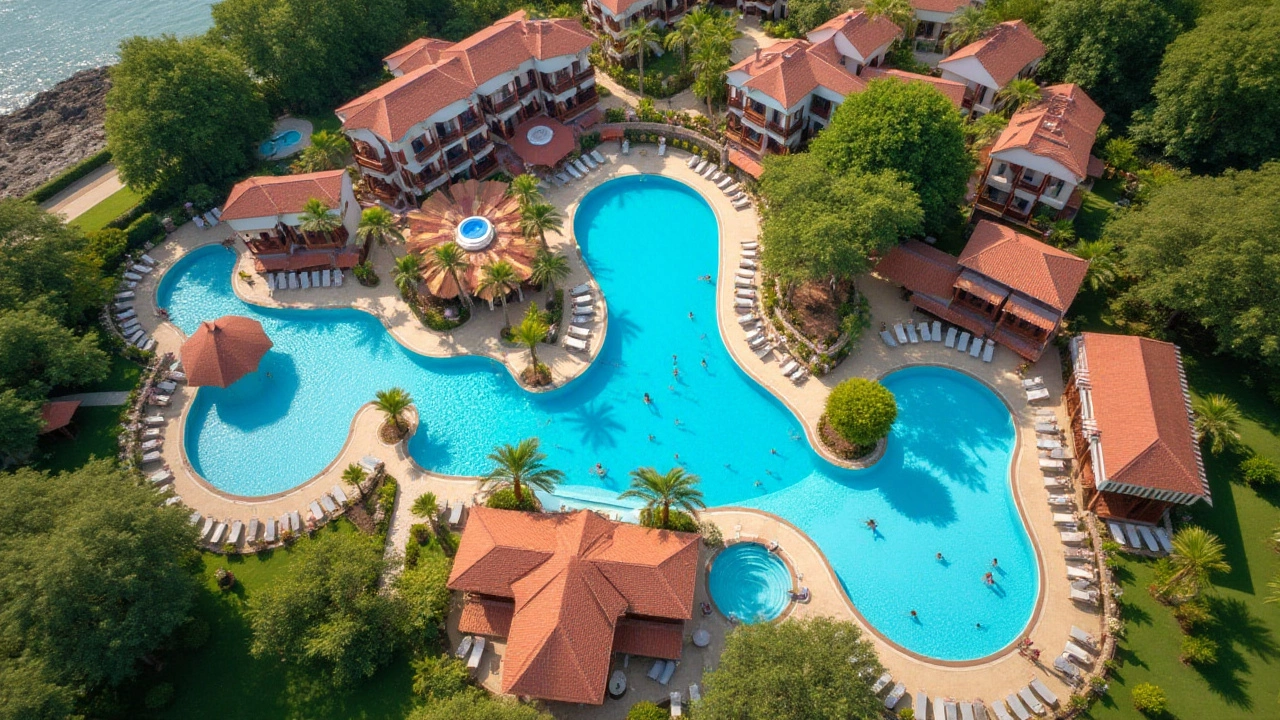All-Inclusive Resorts: A Cost-Effective Gateway to Leisure
 Nov, 4 2024
Nov, 4 2024
Stepping into an all-inclusive resort feels like entering a world where everything is thought out for you—meals, entertainment, and activities, all bundled up in one neat package. For many, this seems like the ideal way to vacation without the stress of planning every detail.
But is it really cheaper to go all-inclusive? This is a question travelers often ponder when booking their next getaway. While these packages promise convenience, it's essential to weigh the costs and see what you're truly getting for your money.
In this exploration, we'll delve into the heart of what makes all-inclusive deals tick, analyzing the expenses covered, comparing them with those of a conventional vacation, and uncovering any hidden costs lurking beneath the surface.
- Understanding All-Inclusive Packages
- Comparing Costs with Traditional Travel
- Hidden Costs and Fees
- Non-Financial Benefits
- Tips for Getting the Best Deals
Understanding All-Inclusive Packages
When you think of all-inclusive resorts, what typically comes to mind is a hassle-free vacation where everything is taken care of before you even set foot on the property. These packages often encompass a broad array of services like accommodation, meals, beverages—both soft and alcoholic—along with activities and entertainment, allowing guests the opportunity to relax without reaching for their wallet at every turn. This approach appeals to travelers who want to enjoy a holiday without constantly calculating their expenses or dealing with unexpected costs.
The concept of all-inclusive vacations sees its roots in the 1950s when Club Med popularized this way of holidaying. Initially focused on providing a communal living experience, the idea soon evolved into the all-encompassing luxuries many of today's resorts offer. The model has diversified significantly over the years, catering to different audiences—families, couples, singles, and even niche markets like wellness retreats and adventure seekers. Understanding the components of an all-inclusive package requires delving into what each resort includes, as offerings can differ markedly.
Crucial Elements of All-Inclusive Deals
Let's break down the typical inclusions in one of these packages: Accommodations form the foundation, ranging from standard rooms to luxurious suites. Meals cover breakfast, lunch, and dinner often served buffet style, though many resorts boast specialty restaurants that require reservation but remain within the package. Drinks, a significant draw, include an assortment of alcohol, yet sometimes premium brands might incur an extra charge. Activities, which can span from scheduled fitness classes to water sports, are generally part of the deal.
Many people wonder about entertainment offerings. Evening shows, live music, and sometimes themed beach parties can fill guests' itineraries, immersing them in a complete experience without the need to leave the resort. As tourism trends shift, resorts are including more wellness-focused initiatives, providing access to fitness centers, and even spa treatments as part of the deal. According to a 2022 survey by the International Travel Association, this has become a sought-after feature, with 40% of travelers expressing interest in relaxing and health-oriented amenities during their stays.
"The beauty of all-inclusive packages is the mental 'stop sign' to spending. Guests can truly unwind knowing their needs are met, which enhances the relaxation experience," asserts Karen Johnson, a travel consultant at Luxury Escapes.
Understanding what a package offers in detail allows travelers to choose accommodations that align with their preferences and budgets. It ensures guests maximize enjoyment and avoid the pitfall of hidden costs, which can detract from the ostensibly seamless experience. Thorough research, aided by reviews and comparisons of resort packages, provides travelers a clearer picture of which all-inclusive setup might best suit their travel style.
Comparing Costs with Traditional Travel
When planning a vacation, the decision between selecting an all-inclusive resort or piecing together a trip oneself is akin to deciding between convenience and control. All-inclusive resorts offer guests a bundle that covers everything from meals to activities, which can simplify budgeting. Yet, these packages often carry the allure of a set price, enticing those wary of unexpected costs. But does this capture the full picture? To make a sound decision, it's essential to dissect each part of the travel experience, like accommodation, dining, and entertainment.
The average cost of a traditional vacation consists of multiple line items: lodging, food, activities, and transportation. Each of these elements can fluctuate based on destination popularity and timing. For example, hotels in cities like Paris or New York may charge an arm and a leg during peak seasons, whereas opting for an all-inclusive holiday in the Caribbean might keep expenses more contained. According to the U.S. Travel Association, average domestic vacation costs reached about $1,200 per person each year. Comparatively, an all-inclusive option often falls within a similar range, but removes the stress of daily financial decisions.
"All-inclusive resorts offer ease for travelers, especially those seeking a seamless experience. Still, it's vital to compare the actual offerings and not just the sticker price." - Frommers, a respected travel guide.
It’s not just the direct monetary outlay at stake. Consider how dining within a budget can impact your travel experiences. A hotel may offer a breakfast buffet, but tasting the local cuisine can be an unforgettable part of a traditional travel itinerary. An all-inclusive deal, though versatile, might lack the unique culinary adventures that often define a place. Additionally, the quality of food and drinks in all-inclusive venues varies significantly, and while some resorts rival top restaurants, others may miss the mark.
Another crucial consideration is entertainment and activities. All-inclusive packages often offer a range of on-site activities such as snorkeling, yoga, and live music but may charge extra for specialized excursions. In contrast, traditional travel allows for bespoke activities tailored to personal interests yet can add up quickly. The key is understanding what you value most: the predictability and ease of an all-inclusive adventure or the freedom and personalized nature of an a la carte journey.
| Expense Category | Traditional Travel | All-Inclusive |
|---|---|---|
| Lodging | $500 - $3,000 | Included |
| Meals | $20 - $200 per day | Included |
| Activities | $100 - $1,000 | Often Included |
| Transportation | Variable | Extra Cost |
So, the next time you plan a getaway, ponder not just the cost but the type of experiences you wish to have. There's no single answer to whether one is cheaper than the other, as it heavily depends on personal preferences, desired experiences, and how much granular control one wishes to maintain over the budget. Whether an "all-inclusive" resort or a traditional travel plan suits you best, it’s crucial to conduct thorough research, set clear priorities, and approach each option with an open mind.

Hidden Costs and Fees
Diving into the world of all-inclusive resorts can sometimes feel like stepping into a meticulously crafted illusion. Everything appears to be part of the package, but lurking beneath this veneer of simplicity, there might be unexpected expenses waiting to catch you by surprise. While the idea is to have everything bundled for a worry-free retreat, scrutinizing what's actually 'inclusive' is crucial to avoid a budget-busting reality.
Many travelers are drawn by the allure of not having to think about individual expenses for food, drinks, and entertainment. However, not all resorts are created equal, and sometimes, the devil is in the details. Certain premium services like fine dining at a specialty restaurant, imported spirits, or exclusive spa treatments may not be included in the standard package. These can often be the very highlights that you dreamt of experiencing, and their additional fees can stack up quickly. It's not uncommon to find yourself footing the bill for these premium services that weren't highlighted during booking.
"It's important for vacationers to go over the fine print of all-inclusive deals to really understand what their money will cover," advises Samantha Brown, noted travel expert and TV host.
Moreover, most resorts charge extra for activities involving external vendors such as scuba diving, parasailing, or other adventure sports. With these activities, guests often have to pay a premium fee, and sometimes these costs can overshadow the expected savings from choosing an all-inclusive deal. Moreover, when venturing off-resort, excursions, tours, and cultural experiences will likely not fall under the hotel’s all-inclusive umbrella, leading to further spending.
Another potential expense that can slip under the radar is tipping. Even though all-inclusive deals advertise that gratuities are covered, many employees depend largely on tips, and it’s customary to reward excellent service. Travelers may find themselves frequently dipping into their wallets to show appreciation for exemplary staff service, adding up to a considerable sum by the end of their stay.
Additionally, room upgrades and late check-out fees are common pain points. Guests might find the base room doesn’t meet expectations, leading to additional charges for a more desirable view or larger space. Understanding the nuances of what each resort offers in its basic package and what constitutes a 'premium' experience can help avoid the shock of a burgeoning bill at the end of the trip.
For those who may have dietary restrictions or specific preferences, it’s crucial to check if these needs are accommodated within the standard package or if special requests prompt additional charges. A thorough investigation into the dining options and their availability can stave off unnecessary surprises.
Staying savvy and inquisitive, asking plenty of questions before booking, and reading reviews from past guests can provide valuable insights. Many travelers successfully enjoy cost-effective stays by identifying potential hidden charges early and choosing all-inclusive packages that genuinely sync with their lifestyle and interests.
Non-Financial Benefits
While the financial aspects of choosing an all-inclusive resort are significant, the non-financial benefits can make this option particularly attractive for travelers of all kinds. These packages are designed to free you from the mundane yet vital decisions that can clutter a vacation, allowing you to focus on what truly matters: relaxation and enjoyment.
One remarkable feature of all-inclusive packages is the unrivaled peace of mind they offer. Imagine stepping into a resort knowing that your meals, drinks, entertainment, and activities are all accounted for. This eliminates the constant need to manage expenses or seek out the best local deals, granting you the liberty to indulge without guilt. The sheer convenience of not having to carry a wallet around the resort can not be overstated.
Forbes notes, "The luxury of an all-inclusive vacation is not just a financial decision; it's an emotional one, where the real gain comes from not stressing over the small details."
Another substantial advantage is the time you save. On a traditional trip, much time is spent planning each day's activities, finding suitable restaurants, and booking excursions. An all-inclusive stay eliminates such hassles. Everything is orchestrated, leaving guests to simply enjoy themselves. Families, in particular, benefit from this arrangement. With meals and activities included, parents can avoid the daily negotiations with their children over meal choices or expensive activities, ensuring a harmonious holiday experience.
In a world where vacation time is precious and often limited, the value of a worry-free time cannot be dismissed. The ease of knowing choices are already made can be liberating. From romantic partners seeking zero-stress ambiance to seniors looking for leisure without logistics, all-inclusive resorts cater to those who value simplicity over spontaneity, offering the ultimate escape.
For those seeking a vacation that prioritizes relaxation above all else, the non-financial benefits offered by all-inclusive resorts are worth considering. In a bustling world, the choice to unwind fully is priceless, making these retreats an attractive option for travelers wanting to make the most of their leisure time.

Tips for Getting the Best Deals
Scoring the best deal on an all-inclusive vacation can feel a bit like finding a hidden treasure. Though these packages bundle a lot for a set price, knowing a few strategies can significantly enhance how much value you get for your money. Let's dive into how you can make your getaway not only enjoyable but also light on the wallet.
Timing is crucial when searching for the best all-inclusive offers. The concept of high and low seasons can play a big role in pricing. Booking during the off-peak times, typically just after the high seasons, can yield substantial savings. Think late spring for Caribbean resorts, where the weather remains pleasant, yet the crowds thin out enough for prices to dip. Travel & Leisure mentioned that "booking just outside of peak holiday periods can save travelers up to 40% on traditional peak season prices."
Another key aspect is flexibility with your travel dates and destination choices. Many airlines and hotels offer packages at discounted rates if travelers are willing to adjust their itineraries slightly. Being open to different locations can also open up a world of similar experiences, sometimes for a fraction of what you'd pay at a sought-after location. An insider tip is to subscribe to travel newsletters or use fare alert services to catch flash deals as soon as they emerge, sometimes offering surprising savings for last-minute travel slots.
Don't overlook direct booking through the resort itself. Sometimes, cutting out the middleman means resorts can offer additional perks or discounts to attract customers directly. Always inquire if there's a possibility of a special offer available exclusively through their website or customer service channels. Additionally, many resorts offer loyalty programs that reward repeat visitors with discounts on future stays, complimentary upgrades, or resort credits that can be used during your stay.
"Maximizing loyalty benefits can sometimes be as simple as signing up for a free membership," advises Jane Smith, a travel analyst at World Travel Group.
Research is your best friend when it comes to vacation costs. Use resources like travel comparison sites to scan multiple options. Pay close attention to what's included in the package: meals, drinks, spa access, tours, and airport transfers should be considered. Knowing what's included helps you weigh whether upgrades for amenities that aren't bundled are worth it. Some packages appear attractive upfront but may incur additional costs for items you assumed were part of the deal.
Lastly, don't shy away from negotiating. Whether it's asking for room upgrades, better views, or additional services like spa treatments, a polite inquiry might yield unexpected extras. Especially during non-peak times, resorts may have more flexibility to accommodate guests with appealing offers. A well-crafted email or phone call can sometimes unlock perks that aren't publicly advertised.